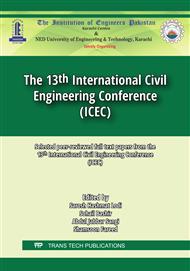[1]
United Nations Environment Programme (UNEP). Cities and Buildings [Report]. Sustainable Consumption and Production Branch; 2012.
Google Scholar
[2]
Satterthwaite D. Sustainable cities or cities that contribute to sustainable development? [Journal]. Urban Studies Journal Limited. University of Glasgow; October 1997. 10: Vol. 34. pp.1667-1691.
DOI: 10.1080/0042098975394
Google Scholar
[3]
Sustainability ICLEI. Local Governments for Sustainable City [Online]. 2016. Available from: http://www.iclei.org/activities/agendas/sustainable-city.html.
Google Scholar
[4]
United Nations. Sustainable Development Challenges: Chapter III Towards Sustainable Cities. In: World Economic and Social Survey [Report]. Department of Economic and Social Affairs, UN. [s.l.]: United Nations; 2013. p.53–84.
DOI: 10.18356/d30cb118-en
Google Scholar
[5]
State New York. Reforming the Energy Vision [Report]. 2016. Available from: https://www.ny.gov/programs/refo
Google Scholar
[6]
Pew Research Center. Democrats hold advantages on environment, abortion, education; neither party has edge on the economy [Report]. [s.l.]: Pew Research Center; 2015.
Google Scholar
[7]
Tayyab S. Investigating the Drinking Water Quality and Associated Health Risks in Metropolis Area of Pakistan [Online]. FRONTIERS. April 8, 2022. Available from: https://www.frontiersin.org/articles/.
Google Scholar
[8]
International Trade Administration. International Trade Association [Online]. Washington, DC: International Trade Association; June 1, 2023. Available from: https://www.trade.gov.
Google Scholar
[9]
Arif H, Mansoor R. Responding to the transport crisis in Karachi [Online]. International Institute of Environment and Development. Available from: https://www.iied.org/10733IIED.html.
Google Scholar
[10]
Sawe BE. The 10 Largest Cities In The World [Online]. Mega Cities Project. May 10, 2019. Available from: https://megacitiesproject.org/the-10-largest-cities-in-the-world/.
Google Scholar
[11]
Cohen S. The Sustainable City [Book]. New York: Columbia University Press; 2017.
Google Scholar
[12]
U.S. Energy Information Administration. Frequently Asked Questions [Online]. Washington, DC: U.S. EIA; 2016. Available from: https://www.eia.gov/tools/faqs/faq.cfm?id=105&t=3.
Google Scholar
[13]
World Health Organization. Drinking-water [Online]. Geneva: World Health Organization; 2015. Available from: http://www.who.int/mediacentre/factsheets/fs391/en/.
Google Scholar
[14]
Hyder M. Problems in the supply & distribution of Water in Karachi [Conference]. [s.l.]: ResearchGate; Oct 2019.
Google Scholar
[15]
Karachi Water and Sewerage Board. Water Management [Online]. Karachi: KWSB. Available from: https://www.kwsb.gos.pk/water-management/.
Google Scholar
[16]
New York City Department of City Planning. Population [Online]. New York: NYC Department of City Planning; 2020. Available from: https://www.nyc.gov/site/ planning/planning- level/nyc-population/nyc-population.page.
DOI: 10.47472/cv7hyvpk
Google Scholar
[17]
World Bank's Carbon Fund Business Unit. Waste Management in China: Issues and Recommendations [Report]. [s.l.]: World Bank's Carbon Fund Business Unit; May 2005.
Google Scholar
[18]
Asian Development Bank. Solid Waste Management Sector in Pakistan [Report]. Annual. Asian Development Bank; 2022.
Google Scholar
[19]
New York Government. ONE NYC [Online]. New York: Office of Climate and Environmental Justice; July 11, 2016. Available from: https://www.nyc.gov/site/sustainability/initiatives/zero-waste-challenge.page.
Google Scholar
[20]
Wang H, Wang C. Municipal solid waste management in Beijing: Characteristics and challenges [Report]. [s.l.]: ResearchGate; Nov 2012.
Google Scholar
[21]
Batool M. Don't Waste Wastewater! Wastewater-to-Energy in Urban Pakistan [Online]. Urbanet. October 12, 2021. Available from: https://www.urbanet.info/wastewater-to-energy-in-urban-pakistan/.
Google Scholar
[22]
New York City Department of Environmental Protection. Environmental Protection [Online]. New York: NYC Department of Environmental Protection. Available from: https://www.nyc.gov/site/dep/water/wastewater-treatment-system.page.
DOI: 10.17226/25218
Google Scholar
[23]
Karachi Municipal Corporation [Online]. Karachi: KMC; 2023. Available from: www.kmc.gos.pk.
Google Scholar
[24]
Orange Line Manager. Use of BRT at Karachi [Interview]. [s.l.]: Karachi; Aug 01, 2023.
Google Scholar
[25]
Mansoor R. Exploring Karachi's transport system problems: A diversity of stakeholder perspectives [Online]. International Institute for Environmental and Development. March 2016. Available from: https://www.iied.org/10773iied. 9781784313135.
Google Scholar
[26]
Batool I, Irshad M, Abid M. A Policy Move towards Sustainable Urban Transport in Pakistan: Measuring the Social, Environmental and Economic Impacts of Lahore BRT System [Article]. The Lahore Journal of Economics. Lahore: The Lahore School of Economics; Spring 2022.
DOI: 10.35536/lje.2020.v25.i1.a2
Google Scholar
[27]
Davis B, Baxandall P. Transportation in Transition: A Look at Changing Travel Patterns in America's Biggest Cities [Report]. Washington, DC: U.S. PIRG Education Fund; 2013.
Google Scholar
[28]
Wardah S. A Study of Solid Waste Management in Karachi City [Journal]. Journal of Education & Social Sciences. Karachi: Geist Science. 2: Vol. 4. pp.151-163.
DOI: 10.20547/jess0421604205
Google Scholar
[29]
Sivak M, Schoettle B. Update: Percentage of Young Persons with a Driver's License Continues to Drop. Traffic Injury Prevention. July 2012. 4: Vol. 13. p.341.
DOI: 10.1080/15389588.2012.696755
Google Scholar
[30]
Sindh Infrastructure Development Company Limited [Online]. Karachi: SIDCL. Available from: https://sidcl.com.pk.
Google Scholar


